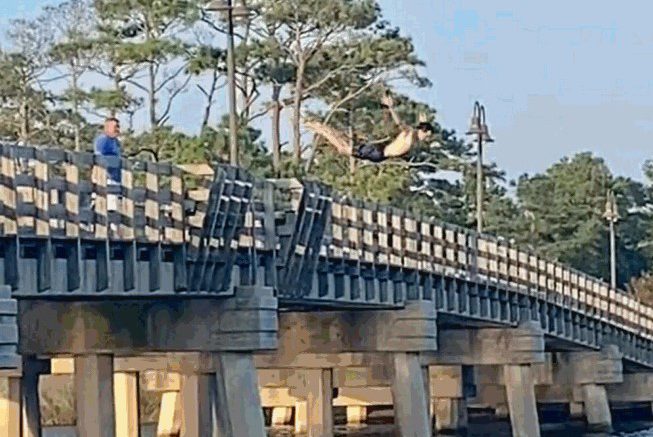Branden Matassa ‘22, OTG editor
Screens.
They are everywhere: on phones, tablets, computers, TVs and even smart watches. Now, consider what it would be like if just the sight of screens caused headaches. That’s the world in which John Grisbacher, an actuarial science major, has lived throughout his first year at LVC.
It was August 2021, only weeks until school started up again, and Grisbacher wanted to take advantage of the summer weather while it lasted. So, he and a few friends decided to take a trip to the Outer Banks, just off the coast of North Carolina.
One activity that Grisbacher planned on doing in the Outer Banks was death diving. Yes, death diving. It is as dangerous as it sounds. Essentially, death diving is when someone jumps off a cliff of around 30 feet, does a stunt, then tucks their body in at the last second as they are about to hit the water.
So, what gives Grisbacher this fearlessness? Well, Grisbacher wouldn’t label himself an adrenaline junkie, but he loves a challenge.
“I always like to be doing something to push myself,” Grisbacher said. “In my free time I like to do parkour.”
When they arrived, they found a bridge about 25 feet above the water. Then they proceeded to jump off the bridge, performing flips and other stunts as they dove into the water. According to Grisbacher, he saw a local man doing backflips off the bridge. So, maybe this bridge was a popular spot.
He even decided to come back the next day to jump some more. Unfortunately, Grisbacher didn’t leave the water without harm. After a day of jumping, he started experiencing headaches and felt he probably had a mild concussion.
In the days that followed, he started to feel foggy and dealt with more painful headaches. This was when he knew something more serious was happening.
When he arrived home, he went to see a doctor and his suspicions were proven true. Grisbacher was diagnosed with a concussion.
As one could guess, his concussion has made this year especially difficult.
“There’s really no timetable and if you do certain things, you’ll make it worse,” Grisbacher said. “I also wanted to minor in computer science but couldn’t because of my concussion.”
Among the things to avoid when diagnosed with a concussion are digital screens and excessive physical activity. This is because these activities will worsen symptoms and slow down recovery.
Since his diagnosis, Grisbacher has tried to avoid engaging in too many strenuous physical activities.
Avoiding screens would be a different challenge. College students constantly require use of the internet for email and assignments. So, Grisbacher needed to adjust the way he learned. Luckily his professors have helped him along the way, by meeting with him in office hours and allowing assignments to be turned in on paper when possible.
Although, Grisbacher wasn’t entirely out of the woods.
“Even in the corner of my eye I get headaches {from screens},” Grisbacher said. “You’d be surprised how many screens there are just going through the lunch line.”
Outside of the lunch line and a few other places, Grisbacher fortunately can avoid screens, mostly because many of his hobbies don’t involve them.
“I’m not really into movies or video games, only sometimes with a group of friends,” Grisbacher said. “I love to learn new things.”
One of his passions is music. Grisbacher has played the flute for years and is currently learning piano. And for him, playing instruments doesn’t interfere with his recovery, so it’s a win-win.
Months passed and his symptoms continued to show. At this point, his doctor told him he was now experiencing post-concussion syndrome, which meant that his concussion was taking longer than normal to heal.
Since then, he has been going to neurotherapy, which uses mental exercises to help heal the brain. His doctor works with him through various exercises to work the part of the brain that’s sensitive. One exercise tests his eye movement through cameras, another sits him in a quiet room waiting to hear a buzzer.
If he continues his treatment and avoids any extensive physical activity or screens, he should recover in the next couple of months.
Of course, one might ask, does Grisbacher regret his death diving experience?
“Maybe I should, but it was more about the lack of self-control I had in jumping over and over even after I had headaches,” Grisbacher said. “I regret that, but not the jumping.”
He even intends to continue jumping and death diving in the future, but only when he’s healthy enough to do so.
“It was really fun, I hope to do it again someday,” Grisbacher said. “Maybe with some better technique and more awareness, but it won’t be for a while until my brain can take that.”
